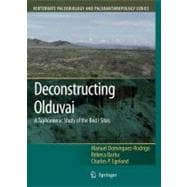
| The "home base" debate | p. 1 |
| The hunting-versus-scavenging debate | p. 11 |
| The "physical attribute" taphonomic approach | p. 23 |
| Geological and paleoecological overview of Olduvai Gorge | p. 33 |
| New estimates of tooth-mark and percussion-mark frequencies at the FLK Zinjanthropus level : the carnivore-hominid-carnivore hypothesis falsified (I) | p. 39 |
| The behavioral meaning of cut marks at the FLK Zinj level : the carnivore-hominid-carnivore hypothesis falsified (II) | p. 75 |
| A cautionary tale about early archaeological sites : a reanalysis of FLK North 6 | p. 101 |
| A palimpsest at FLK North 1-2 : independent carnivore - and hominid - made bone accumulations | p. 127 |
| A taphonomic study of FLK North 3 and 4 : a felid-hyaenid and hominid palimpsest | p. 165 |
| Zooarchaeology and taphonomy of FLK North 5 | p. 191 |
| Natural background bone assemblages and their ravaging stages in Olduvai Bed I | p. 201 |
| FLK North North 1 : "living floor" or natural accumulation? | p. 217 |
| Zooarchaeology and taphonomy of FLK North North 2 | p. 229 |
| Reanalysis of FLK North North 3 : yet another case of a palimpsest? | p. 239 |
| Zooarchaeology and taphonomy of the DK site | p. 253 |
| Table of Contents provided by Blackwell. All Rights Reserved. |
The New copy of this book will include any supplemental materials advertised. Please check the title of the book to determine if it should include any access cards, study guides, lab manuals, CDs, etc.
The Used, Rental and eBook copies of this book are not guaranteed to include any supplemental materials. Typically, only the book itself is included. This is true even if the title states it includes any access cards, study guides, lab manuals, CDs, etc.